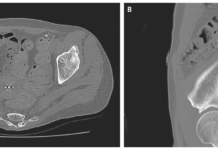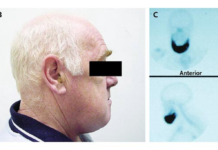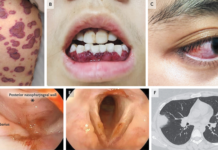
A 40-year-old got recently diagnosed with hypertension and started taking lisinopril. Three days later, she presented to the ED with angioedema of the small bowels!
A 40-year-old female, known case of irritable bowel syndrome and a newly diagnosed hypertension, presented to the emergency department with complaints of diffuse abdominal pain, bloating, nausea, and vomiting for the past 24 hours. The patient denied any other symptoms including itching or rash. Two days prior to this presentation, the patient had visited another emergency department with abdominal pain, chest pain, and nausea. However, the cardiac work-up was unremarkable, therefore the doctors discharged him in stable condition. Her usual medications included an oral contraceptive pill. Approximately 3 days prior to the presentation she had started taking lisinopril 20 mg daily.
During the current presentation, in the ED her vital signs were normal. Physical examination revealed a normal oropharynx with no swelling. However, the doctors noticed moderate generalized abdominal tenderness. However, rebound tenderness, guarding, and rigidity were absent. The rest of the physical examination was unremarkable.
Her blood results showed mild leukocytosis of 13,000 only. The rest of the results were normal including electrolytes, liver functions, urinalysis, lipase, lactic acid, and troponin. Moreover, EKG and chest X-ray were normal too.
The doctors started her on intravenous (IV) fluids and hydromorphone for persistent pain. However, despite the treatment, she continued to have diffuse abdominal pain and tenderness.
An abdominal computed tomography scan with oral and IV contrast revealed a moderate amount of ascites with diffuse wall thickening, hyperenhancement, and mucosal oedema of the entire small intestines. With the investigations and the history revealing the recent start of an ACE inhibitor, the patient received a diagnosis of angioedema of the small intestine due to ACE-inhibitor (ACEi).
ACEi and Angioedema
Angioedema is a subcutaneous/submucosal tissue swelling secondary to capillary leakage and transudation of fluid into the interstitial tissue. ACEi reduces the degradation of bradykinin, therefore, the levels of bradykinin increase in the upper respiratory and gastrointestinal tracts. Consequently, bradykinin excess results in angioedema. It can take a few days or months to have this side-effect of ACEi.
The doctors discontinued her Lisinopril and admitted the patient for observation and further evaluation. Reducing the dose, instead of discontinuing, is not suitable. Angioedema due to ACEi is not dose-dependent. With supportive care and discontinuation of Lisinopril, the patient gradually improved. A hereditary angioedema workup showed normal complement and C1 esterase inhibitor levels. since the patient stabilised, the doctors discharged her.
One week later, a repeat computed tomography scan demonstrated complete resolution of her visceral angioedema and near-complete resolution of the ascites.



